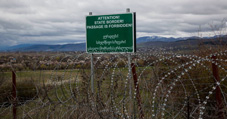
EU in Georgia issues statement on “borderization” in Gugutiantkari
By Nika Gamtsemlidze
Wednesday, August 21
EU Delegation to Georgia, in agreement with EU Heads of Mission in Georgia, issued a special statement on “borderisation” activities in the area of Gugutiantkari village.
As the statement reads, the erection of fences by de-facto authorities of South Ossetia backed by Russian border guards in the vicinity of Gugutiantkari village hinders freedom of movement and will deprive people from the local area from accessing orchards and water resources.
“It is crucial that this work is stopped and that all relevant actors make active use of the existing mechanisms for communication - the Hotline and the Ergneti Incident Prevention and Response Mechanism format,” reads the statement.
According to the statement, the European Union remains engaged and involved in stabilization and conflict resolution efforts in Georgia, including by continuing its engagements as co-chair in the Geneva discussions, the efforts of the European Union Special Representative for the South Caucasus and the crisis in Georgia (EUSR), and the continued presence on the ground of the EU Monitoring Mission (EUMM).
“The European Union will continue to support the sovereignty and territorial integrity of Georgia within its internationally recognized borders,” reads the statement.
Russian forces appeared near the village on August 7th and started installing metal poles, after which they started installing wire fences. The issue has been discussed by international corps, representatives of Georgian government. Some of the Ambassadors and representatives of different embassies even arrived at scene to talk with locals.
Foreign Affairs Minister, Davit Zalkaliani was one of the first ones from Georgian government to visit the village, he met with locals and talked about their problems.
Although many international organizations made statements on this regard, Russian forces still continue the illegal process of “borderization”.
Creeping occupation has been a huge problem for Georgia for several years now. Because of it, people lost their homes, it even managed to swallow numerous Georgian villages. The process started after the Russia-Georgian War, which was fought between Georgia, Russia and the Russian-backed self-proclaimed republics of so-called South Ossetia and Abkhazia.


